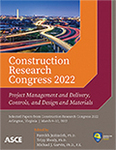Identifying and Prioritizing Criteria for Selecting Sustainable Façade Materials of High-Rise Buildings
Publication: Construction Research Congress 2022
ABSTRACT
Buildings have a significant and continuously increasing impact on the environment because they are responsible for using a considerable number of resources and a large amount of energy besides emitting a large portion of carbon. In recent years, numerous attempts have been made to reduce these harmful impacts of construction activities to achieve sustainable development goals. Careful selection of buildings materials has been identified as the first step for designers to incorporate sustainable principles in building projects. As far as sustainability is concerned, façade plays a prominent role in high-rise buildings. Therefore, criteria for selecting sustainable facade materials of high-rise buildings should be studied in order to have sustainable buildings. In this paper, a comprehensive list of sustainability criteria for selecting façade materials is presented through extensive literature review and expert interviews; afterward, these criteria are prioritized using Fuzzy Analytical Hierarchal Process (FAHP) model using a survey. The study’s results showed that the environmental criteria are of the highest importance from the point of view of experts. Followed by the economic, technical, and social criteria group respectively. The result of this study could help decision-makers in selecting façade materials during design phase.
Get full access to this article
View all available purchase options and get full access to this chapter.
REFERENCES
Abeysundara, U. Y., Babel, S., and Gheewala, S. 2009. A matrix in life cycle perspective for selecting sustainable materials for buildings in Sri Lanka. Building and environment, 44(5), 997–1004.
Akadiri, P. O., Olomolaiye, P. O., and Chinyio, E. A. 2013. Multi-criteria evaluation model for the selection of sustainable materials for building projects. Automation in construction, 30, 113–125.
Askari, M., Shokrizadeh, H. R., and Ghane, N. 2014. A fuzzy AHP model in risk ranking. European Journal of Business and Management, 194–202.
Buckley, J. J. (1985). Ranking alternatives using fuzzy numbers. Fuzzy sets and systems, 15(1), 21–31.
Cabrerizo, F. J., Chiclana, F., Al-Hmouz, R., Morfeq, A., Balamash, A. S., and Herrera-Viedma, E. 2015. Fuzzy decision making and consensus: challenges. Journal of Intelligent & Fuzzy Systems, 29(3), 1109–1118.
Castro-Lacouture, D., Sefair, J. A., Flórez, L., and Medaglia, A. L. 2009. Optimization model for the selection of materials using a LEED-based green building rating system in Colombia. Building and environment, 44(6), 1162–1170.
Chang, D. Y. 1996. Applications of the extent analysis method on fuzzy AHP. European journal of operational research, 95(3), 649–655.
Erfani, A., Tavakolan, M., Mashhadi, A. H., and Mohammadi, P. 2021. Heterogeneous or homogeneous? A modified decision-making approach in renewable energy investment projects. AIMS Energy, 9(3), 558–580.
Florez, L., and Castro-Lacouture, D., 2013. Optimization model for sustainable materials selection using objective and subjective factors. Materials & Design, 46, pp.310–321.
GAMS (General Algebraic Modeling System). www.gams.com,. 2020.
Gilani, G., Blanco, A., and De la Fuente, A. 2017. A new sustainability assessment approach based on stakeholder’s satisfaction for building facades. Energy Procedia, 115, 50–58.
González, M. J., and Navarro, J. G. 2006. Assessment of the decrease of CO2 emissions in the construction field through the selection of materials: Practical case study of three houses of low environmental impact. Building and environment, 41(7), 902–909.
Govindan, K., Shankar, K. M., and Kannan, D. 2016. Sustainable material selection for construction industry–A hybrid multi criteria decision making approach. Renewable and Sustainable Energy Reviews, 55, 1274–1288.
Huovila, P., Ala-Juusela, M., Melchert, L., Pouffary, S., Cheng, C. C., Ürge-Vorsatz, D., Koeppel, S., Svenningsen, N., and Graham, P. 2009. Buildings and climate change: Summary for Decision-Makers.
Mirrahimi, S., Mohamed, M. F., Haw, L. C., Ibrahim, N. L. N., Yusoff, W. F. M., and Aflaki, A. 2016. The effect of building envelope on the thermal comfort and energy saving for high-rise buildings in hot–humid climate. Renewable and Sustainable Energy Reviews, 53, 1508–1519.
Moghtadernejad, S. 2013. Design, inspection, maintenance, life cycle performance and integrity of building facades (Doctoral dissertation, McGill University Libraries).
Monzer, N., Fayek, A. R., Lourenzutti, R., and Siraj, N. B. 2019. Aggregation-based framework for construction risk assessment with heterogeneous groups of experts. Journal of Construction Engineering and Management, 145(3), 04019003.
Nadoushani, Z. S. M., Akbarnezhad, A., Jornet, J. F., and Xiao, J. 2017. Multi-criteria selection of façade systems based on sustainability criteria. Building and Environment, 121, 67–78.
Pan, W., Qin, H., and Zhao, Y. 2017. Challenges for energy and carbon modeling of high-rise buildings: The case of public housing in Hong Kong. Resources, Conservation and Recycling, 123, 208–218.
Saaty, T. L. 2014. Analytic heirarchy process. Wiley statsRef: Statistics reference online.
Singhaputtangkul, N., Low, S. P., Teo, A. L., and Hwang, B. G. 2014. Criteria for architects and engineers to achieve sustainability and buildability in building envelope designs. Journal of Management in Engineering, 30(2), 236–245.
Van Laarhoven, P. J., and Pedrycz, W. 1983. A fuzzy extension of Saaty’s priority theory. Fuzzy sets and Systems, 11(1-3), 229–241.
Information & Authors
Information
Published In
History
Published online: Mar 7, 2022
Authors
Metrics & Citations
Metrics
Citations
Download citation
If you have the appropriate software installed, you can download article citation data to the citation manager of your choice. Simply select your manager software from the list below and click Download.
